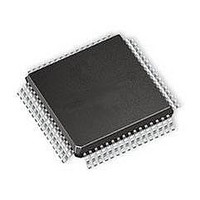Z16FMC32AG20SG Zilog, Z16FMC32AG20SG Datasheet - Page 200

Z16FMC32AG20SG
Manufacturer Part Number
Z16FMC32AG20SG
Description
Microcontrollers (MCU) 16BIT 32K FL 2K RAM 2UART 12CH 10BIT A/D
Manufacturer
Zilog
Series
Z16FMCr
Datasheet
1.Z16FMC28AG20_EG.pdf
(341 pages)
Specifications of Z16FMC32AG20SG
Processor Series
Z16FMC
Core
ZNEO
Data Bus Width
16 bit
Program Memory Type
Flash
Program Memory Size
32 KB
Data Ram Size
2 KB
Interface Type
I2C, SPI, UART
Maximum Clock Frequency
20 MHz
Number Of Programmable I/os
46
Operating Supply Voltage
2.7 V to 3.6 V
Maximum Operating Temperature
+ 70 C
Mounting Style
SMD/SMT
Package / Case
LQFP-64
Development Tools By Supplier
Z16FMC28200KITG
Minimum Operating Temperature
0 C
Core Processor
ZNEO
Core Size
16-Bit
Speed
20MHz
Connectivity
I²C, IrDA, LIN, SPI, UART/USART
Peripherals
Brown-out Detect/Reset, DMA, POR, PWM, WDT
Number Of I /o
46
Eeprom Size
-
Ram Size
4K x 8
Voltage - Supply (vcc/vdd)
2.7 V ~ 3.6 V
Data Converters
A/D 12x10b
Oscillator Type
Internal
Operating Temperature
0°C ~ 70°C
Lead Free Status / Rohs Status
Details
Available stocks
Company
Part Number
Manufacturer
Quantity
Price
Company:
Part Number:
Z16FMC32AG20SG
Manufacturer:
Zilog
Quantity:
160
- Current page: 200 of 341
- Download datasheet (21Mb)
PS028702-1210
ters accessing different Slaves) or during the data phase when the Masters are attempting
to write different data to the same Slave.
When a Master loses arbitration, software is informed by means of the Arbitration Lost
interrupt. Software repeats the same transaction again at a later time.
A special case occurs when a slave transaction starts just before software attempts to start
a new master transaction by setting the
slave states before the START bit is set and the I
address match occurs and the I
cleared and an Arbitration Lost interrupt is asserted. Software minimizes the chance of
this occurring by checking the BUSY bit in the I2CSTATE Register before initiating a
master transaction. If a slave address match does not occur, the Arbitration Lost interrupt
does not occur and the
transaction after the I
Master Address Only Transactions
It is sometimes appropriate to perform an address-only transaction to determine if a partic-
ular Slave device is able to respond. This transaction is performed by monitoring the
ACKV bit in the I2CSTATE Register after the address has been written to the I2CDATA
Register and the START bit has been set. After ACKV is set, the ACK bit in the
I2CSTATE Register determines if the Slave is able to communicate. The STOP bit must be
set in the I2CCTL Register to terminate the transaction without transferring data. For a 10-
bit slave address, if the first address byte is acknowledged, the second address byte must
also be sent to determine if the appropriate slave is responding.
Another approach is to set both the STOP and START bits (for sending a 7-bit address).
After both bits are cleared (7-bit address has been sent and transaction is complete), the
ACK
bit after the second TDRE interrupt (second address byte is being sent).
Master Transaction Diagrams
In the following transaction diagrams, shaded regions indicate data transferred from the
Master to the Slave and unshaded regions indicate data transferred from the Slave to the
Master. The transaction field labels are defined as:
S
W
A
A
P
bit is read to determine if the slave is acknowledged. For a 10-bit slave, set the STOP
Start
Write
Acknowledge
Not Acknowledge
Stop
2
C bus is no longer busy.
START
P R E L I M I N A R Y
bit is not cleared. The I
2
C Controller receives or transmits data, the
START
bit. In this case the state machine enters the
Z16FMC Series Motor Control MCUs
2
C Controller does not arbitrate. If a slave
2
C Controller initiates the master
I2C Master/Slave Controller
Product Specification
START
bit is
178
Related parts for Z16FMC32AG20SG
Image
Part Number
Description
Manufacturer
Datasheet
Request
R

Part Number:
Description:
Microcontrollers (MCU) 16BIT 128K FL 4KRAM 2UART 12CH 10BIT A/D
Manufacturer:
Zilog
Datasheet:

Part Number:
Description:
Microcontrollers (MCU) 16BIT 64K FL 4K RAM 2UART 12CH 10BIT A/D
Manufacturer:
Zilog
Datasheet:

Part Number:
Description:
Microcontrollers (MCU) 16BIT 32K FL 2K RAM 2UART 12CH 10BIT A/D
Manufacturer:
Zilog
Datasheet:

Part Number:
Description:
Microcontrollers (MCU) 16BIT 64K FL 4K RAM 2UART 12CH 10BIT A/D
Manufacturer:
Zilog
Datasheet:

Part Number:
Description:
Microcontrollers (MCU) 16BIT 128K FL 4KRAM 2UART 12CH 10BIT A/D
Manufacturer:
Zilog

Part Number:
Description:
Communication Controllers, ZILOG INTELLIGENT PERIPHERAL CONTROLLER (ZIP)
Manufacturer:
Zilog, Inc.
Datasheet:

Part Number:
Description:
KIT DEV FOR Z8 ENCORE 16K TO 64K
Manufacturer:
Zilog
Datasheet:

Part Number:
Description:
KIT DEV Z8 ENCORE XP 28-PIN
Manufacturer:
Zilog
Datasheet:

Part Number:
Description:
DEV KIT FOR Z8 ENCORE 8K/4K
Manufacturer:
Zilog
Datasheet:

Part Number:
Description:
KIT DEV Z8 ENCORE XP 28-PIN
Manufacturer:
Zilog
Datasheet:

Part Number:
Description:
DEV KIT FOR Z8 ENCORE 4K TO 8K
Manufacturer:
Zilog
Datasheet:

Part Number:
Description:
CMOS Z8 microcontroller. ROM 16 Kbytes, RAM 256 bytes, speed 16 MHz, 32 lines I/O, 3.0V to 5.5V
Manufacturer:
Zilog, Inc.
Datasheet:

Part Number:
Description:
Low-cost microcontroller. 512 bytes ROM, 61 bytes RAM, 8 MHz
Manufacturer:
Zilog, Inc.
Datasheet:

Part Number:
Description:
Z8 4K OTP Microcontroller
Manufacturer:
Zilog, Inc.
Datasheet:











